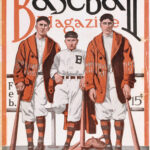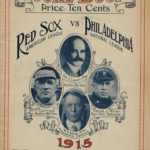Cincinnati, of course, had a chance to win an unsoiled Series in 1939. Instead, the Reds hung out their own dirty linen as the powerful New York Yankees zapped them in four games. Plainly, this World Series evoked few pleasant memories for the Reds.
Hopes that 1940 might be different rose when Bill McKechnie’s club raced to 100 victories and a 12-game margin in the NL pennant race. The hopes rose even higher when it was determined that the noted NL exterminators from the Bronx wouldn’t qualify for the fall classic.
While the 1940 AL champions were not the Yankees, they looked like the Yankees. The Detroit Tigers, who finished one game ahead of Cleveland and two in front of New York, had a 1-2 punch that combined for 74 home runs and 284 runs batted in. Plus, four Tiger regulars batted .313 or higher.
The Tigers exhibited some of their offensive prowess in the opening game of the World Series, knocking Paul Derringer from the mound in a five-run second and coasting to a 7-2 victory. Pinky Higgins, Dick Bartell and Bruce Campbell each knocked in two runs for the Tigers, who got eight-hit pitching from Bobo Newsom. Newsom’s joy over his performance ended abruptly, though, with the news the next morning of the death of his father, who had come from South Carolina to see him pitch.
Jimmy Ripple’s two-run home run and Bucky Walters’ three-hit pitching enabled Cincinnati to win, 5-3, the next day and even the Series. The Tigers regained the upper hand in Game 3 as Rudy York and Higgins belted two-run homers in the seventh — the score was tied 1-1 entering the inning — and pushed the Tigers toward a 7-4 decision. York had 33 homers and 134 RBIs.
The Reds’ Derringer rebounded from his pasting in the Series opener and spun a five-hitter in Game 4. His 5-2 victory left the Series tied, 2-2.
The seesaw nature of the 1940 World Series continued in Game 5, with Detroit resting on the high end of the plank after winning convincingly. Newsom, obviously emotion-racked, threw a three-hitter and won, 8-0, as Hank Greenberg unloaded a three-run homer and drove in four runs. Greenberg was coming off a monstrous year, having mauled AL pitchers for 41 homers, 150 RBIs and a .340 batting average.
Games 6 and 7 would be played in Cincinnati, but any edge the home field was providing in this Series was offset by the pattern of alternating victories. It was Cincinnati’s turn to win in the sixth game and, sure enough, the Reds delivered. Walters not only fired a five-hit shutout, he also homered in a 4-0 victory.
Tigers Manager Del Baker called on his best pitcher for Game 7, even if that pitcher was coming off only one day of rest. Newsom was his man. McKechnie opted for Derringer, who had two days of rest.
Newsom, a 20-game winner in the American League for the third consecutive season, was the beneficiary of an unearned run in the third inning and made that run stand up through six innings. However, Frank McCormick, easily the Reds’ top power threat (19 homers and 127 RBIs in ’40), and Ripple hit consecutive doubles to open the Reds’ seventh. With the game tied, 1-1, Jimmie Wilson bunted Ripple to third. After pinch-hitter Ernie Lombardi was given an intentional walk, Billy Myers drove home Ripple with a fly ball to deep center.
Derringer, leading 2-1, went to work in his bid to nail down the Series. He allowed an inning-opening single to Charlie Gehringer in the eighth, then retired the Tigers’ next six batters. The alternating-victory sequence had ended, and so had Cincinnati’s long wait for Series triumph No. 2.
Derringer and Walters, 20-game winners again in 1940 (Derringer for the third straight season and Walters for the second), atoned for their winless efforts in the ’39 Series by posting two victories apiece this time. The Reds’ Bill Werber batted a Series-high .370, Wilson hit .353 and Ripple finished at .333. Ripple and Ival Goodman had six and five RBIs, respectively, for the winners.
Wilson, a 40-year-old Reds coach, was pressed into late-season catching duty when Lombardi suffered an ankle injury and wound up starting six World Series games after appearing in 16 regular-season games. The season, while ending on a joyous note for Cincinnati, had sadness, too. In early August, Reds reserve catcher Willard Hershberger had committed suicide in his Boston hotel room.
Detroit’s standout in the Series was Newsom, who won two of three decisions and recorded a 1.38 earned-run average in 26 innings. Campbell, Greenberg and Higgins posted .360, .357 and .333 averages and Barney McCosky — like Greenberg a .340 batsman in the regular season –had a .304 Series mark, none of which was enough to prevent the Cincinnati Reds from winning their first World Series of the non-tainted variety.




